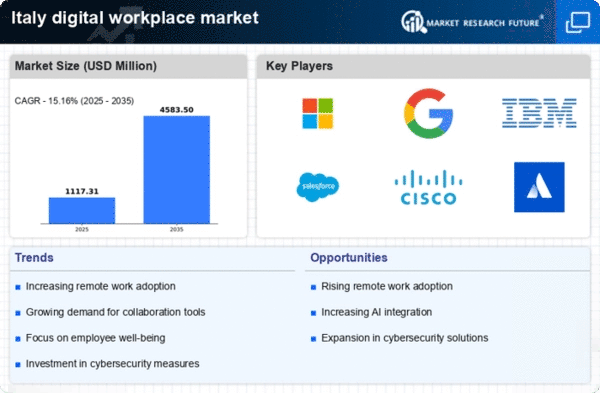Investment in Cybersecurity Measures
As the digital workplace market evolves, the emphasis on cybersecurity becomes paramount for organizations in Italy. With the increasing reliance on digital tools, the potential for cyber threats escalates, prompting businesses to allocate substantial budgets towards cybersecurity solutions. In 2025, it is estimated that Italian companies will invest over €1 billion in cybersecurity measures to protect sensitive data and maintain operational integrity. This investment is crucial for fostering trust among employees and clients alike. The digital workplace market is responding by integrating advanced security features into their offerings, ensuring that organizations can operate safely in a digital environment.
Rising Demand for Remote Work Solutions
The digital workplace market in Italy experiences a notable surge in demand for remote work solutions. As organizations increasingly recognize the benefits of flexible work arrangements, the market is projected to grow at a compound annual growth rate (CAGR) of approximately 12% over the next five years. This shift is driven by the need for enhanced collaboration tools and secure access to company resources from various locations. Companies are investing in technologies that facilitate seamless communication and project management, thereby improving productivity and employee satisfaction. The digital workplace market is adapting to these changes by offering innovative solutions that cater to the evolving needs of businesses and their workforce.
Integration of Collaborative Technologies
The integration of collaborative technologies is a driving force within the digital workplace market in Italy. As teams become more dispersed, the need for effective collaboration tools intensifies. In 2025, it is anticipated that the market for collaborative software will grow by 15%, reflecting the increasing demand for solutions that facilitate teamwork and communication. This trend is indicative of a broader shift towards a more interconnected work environment, where digital tools play a crucial role in enhancing collaboration. The digital workplace market is responding by developing innovative platforms that support real-time collaboration, thereby enabling organizations to thrive in a competitive landscape.
Focus on Digital Transformation Initiatives
The digital workplace market in Italy is significantly influenced by the ongoing digital transformation initiatives across various sectors. Organizations are increasingly recognizing the necessity of adopting digital technologies to enhance operational efficiency and customer engagement. In 2025, it is projected that approximately 70% of Italian companies will prioritize digital transformation as a key strategic objective. This trend is likely to drive the demand for digital workplace solutions that support collaboration, data analytics, and process automation. The digital workplace market is thus positioned to provide tools that facilitate this transformation, enabling businesses to remain competitive in a rapidly changing landscape.
Emphasis on Employee Training and Development
In the context of the digital workplace market, there is a growing emphasis on employee training and development in Italy. Organizations are increasingly aware that equipping their workforce with the necessary skills to navigate digital tools is essential for maximizing productivity. It is estimated that companies will invest around €500 million in training programs by 2025, focusing on enhancing digital literacy and proficiency. This investment not only benefits employees but also contributes to the overall success of the digital workplace market by fostering a culture of continuous learning and adaptation to new technologies.
















